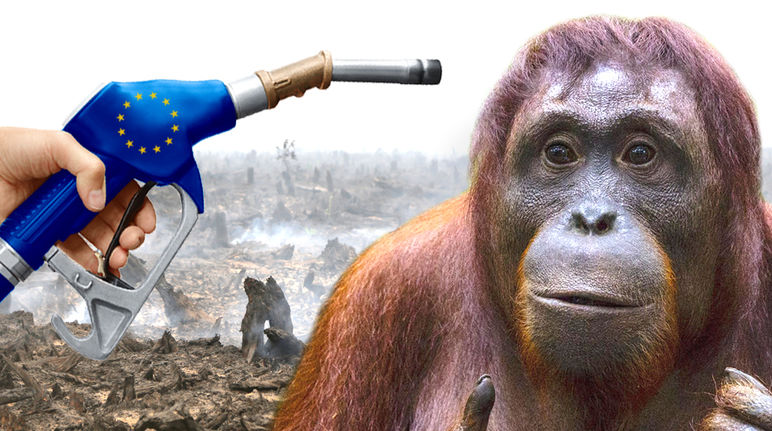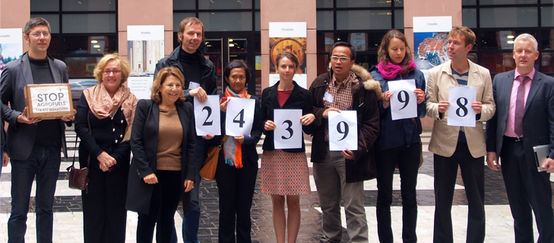EU destroys 700,000 hectares of rainforest for biofuels
 The biofuels policy of the EU is destroying rainforests (© Composer/Fotolia + Shebalso/Flickr - Montage: Rettet den Regenwald)
The biofuels policy of the EU is destroying rainforests (© Composer/Fotolia + Shebalso/Flickr - Montage: Rettet den Regenwald)
The EU wants to save our climate with supposedly green biofuels and has deemed palm oil "sustainable". Yet on the other side of the globe, rainforests are being clear-cut to produce the 1.9 million tons of palm oil that end up in European fuel tanks every year. Tell EU legislators to put an end to this tragically misguided policy!
News and updates Call to actionTo: the European Commission, the Council of the European Union, the European Parliament and the governments of the EU member countries
“Tell the EU to abandon its misguided biofuels policy now.”
The European Union wants to protect the climate and reduce carbon emissions from motor vehicles by blending fuels with increasing shares of supposedly eco-friendly “biofuels”.
Last year, 1.9 million tons of palm oil were added to diesel fuel in the EU – in addition to millions of tons of equally harmful rapeseed and soybean oils.
The plantations needed to satisfy Europes's demand for palm oil cover an area of 700,000 hectares – land that until recently was still rainforest and the habitat of 5,000 endangered orangutans. Despite the clear-cutting, the EU has classified palm oil as sustainably produced.
This policy has now blown up in the legislators’ faces, with scientists confirming what environmentalists and development experts have long asserted: biofuels help neither people nor the environment – and they are most certainly not climate-neutral, as even studies commissioned by the EU show. Biodiesel from palm and soybean oil, but also from European-grown rapeseed, has a larger carbon footprint than diesel from fossil sources.
The EU must scrap its biofuels policy immediately, but the agri-industry is fighting hard to maintain the status quo. Not surprising, when one considers that biofuels are currently subsidized to the tune of 10 billion euros in the EU alone.
Decision making in the European Union is a long process and involves many different actors that bring in studies, reports, arguments, and numbers. Hundreds of industry lobbyists seek to influence this process and they are trying hard to protect their financial interests. Next, the European Parliament and its committees along with the Council of the European Union will need to agree on a compromise based on the proposal published in October 2012.
Please sign our petition to the EU and demand an end to biofuels.
BackgroundEvery year, 14 million tons of so-called biofuels are blended with gasoline and diesel in the EU. This is slated to increase to 30 million tons by 2020, enough to replace ten percent of the fossil fuel share. Ever-increasing quantities of biofuels, or resources such as palm and soybean oil required for their production, are being imported from overseas. In South America, rainforests and savannas are being burned to make way for the cultivation of sugarcane for ethanol and soy monocultures for biodiesel.
In Southeast Asia, rainforests are being felled, above all for palm oil plantations. With a market share of nearly 90 percent, Malaysia and Indonesia are the two largest palm oil producers – and are also responsible for the most extensive destruction of rainforest. The horrific consequences of the EU biofuels can be seen in Malaysia and elsewhere. On Borneo, the state-owned Yayasan Sabah Group is clearing 70,000 hectares of rainforest to make room for oil palms.14 of Borneo's endangered pygmy elephants were poisoned there because they inconvenienced the plantation companies.
These plantations are certified by the “Roundtable on Sustainable Palm Oil (RSPO)”. The palm oil they produce is thus classified as “sustainable” by the EU and can be added to biodiesel. Six million tons of palm oil, by far the cheapest vegetable oil, are flowing onto the European market annually.
The European Union accepts the cheap palm oil because it has been labeled sustainable - although deforestations can be linked directly to the production of palm oil. Biodiesel that is blended with palm oil is about 30% cheaper than the use of rapeseed oil would be.
The Finnish corporation Neste Oil and the US-based corporations ADM and Cargill have already constructed palm oil plantations in South East Asia, partly in cooperation with companies such as Wilmar and IOI. Finnish Neste Oil has even built two palm oil diesel-refineries in Singapore and Rotterdam, which are only producing biofuels for the European market. The refinery in Rotterdam has imported 400,000 tons of palm oil in 2012 for this purpose.
Raw materials for the production of EU biofuels in 2012 (total volume: 9.4 million tons):
Rapeseed oil: 5.4 million tons (57%)
Palm oil: 1.9 million tons (20%)
Soybean oil: 0.5 million tons (5%)
Sunflower oil: 0.1 million tons (1,1%)
Tallow and grease (slaughterhouse waste): 0.5 million tons (5,3%)
Recycled oils ("chip fat"): 1 million tons (10,6%)
Palm oil usage for biofuels in the EU
2006: 0.4 million tons
2012: 1.87 million tons
Increase: 365%
Source: IISD 9-2013: The EU Biofuel Policy and Palm Oil: Cutting subsidies or cutting rainforest?
To: the European Commission, the Council of the European Union, the European Parliament and the governments of the EU member countries
Ladies and Gentlemen,
To my great consternation, I have learnt that the European Commission plans to uphold its policy of promoting “biofuels” – despite the fact that they not only lead to more hunger in the world, but also have catastrophic consequences for the environment and the climate. Worldwide, industrial monocultures are spreading at the expense of natural ecosystems and destroying biodiversity.
Environmentalists, human-rights activists, scientists, development experts and even international organizations such as the United Nations and the OECD have demanded for years that the EU put an end to its harmful biofuel policy.
Even the findings of scientific studies undertaken on behalf the European Commission show that biodiesel from palm, soybean and rapeseed oil causes more greenhouse gas emissions than fossil diesel fuel.
Because palm oil is so much cheaper than any other vegetable oil, exports into the European Union are increasing. Palm oil plantations are the main reason for the destrction of the rainforest, despite the labels issued by the RSPO.
Moreover, biofuel production also consumes huge quantities of water, as well as fertilizers and pesticides that pollute the environment and adversely impact human health. Even here in Europe, farmland birds are disappearing because their habitat is being lost to rapeseed monocultures.
None of these serious problems can be solved by setting a limit of five percent for biofuels derived from foodstuffs and counting the volumes from biofuels from waste and cellulose in quadruple, as the Commission is proposing now.
Please abolish the mandatory blending of biofuels and eliminate all related tax benefits, subsidies and imports immediately.
The human right to food, the preservation of biodiversity and the protection of the environment must take priority over the one-sided business interests of the biofuels industry.
Yours sincerely,
Strasbourg: 243,998 signatures against agrofuels handed over

Rainforest Rescue and other environmental and human rights organizations have collected 243,998 signatures of people who call for a change in the fatal agrofuels policy of the European Union.
Forests ablaze in Sumatra – and the EU pours oil on the fire
Rainforests are burning on the Indonesian island of Sumatra. The arsonists: palm oil companies that need land for their plantations. And while humans, animals and plants are helpless in the face of the fires, the EU industry committee just voted to increase the biofuel share in motor vehicle fuels.













 Recent successes
Recent successes